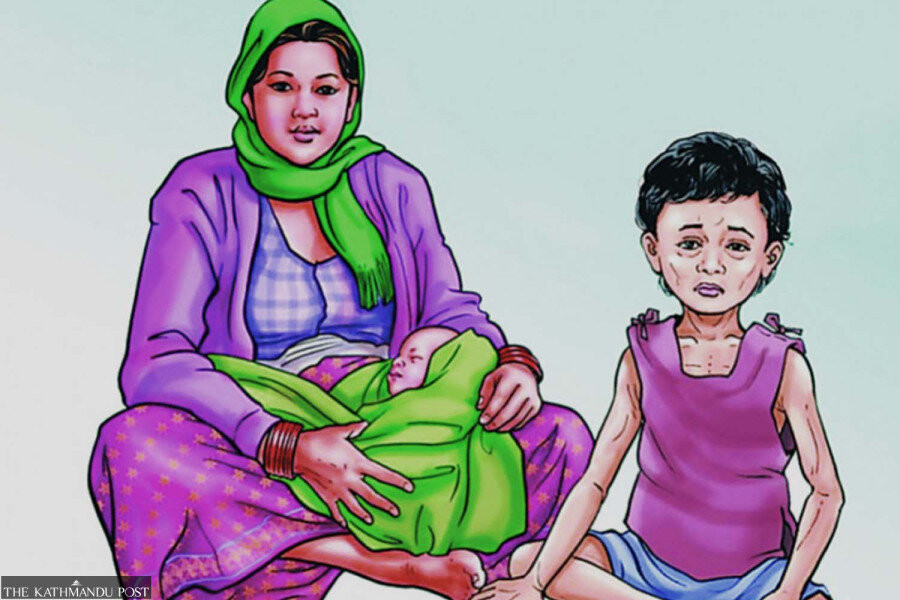Health
Karnali mums and children bear the brunt of budget cuts
Experts warn that decades of progress in improving nutrition in Nepal is now at risk.
Post Report
With the federal government slashing the budget of the nutrition programme, the distribution of fortified flour has been halted in all five districts of Karnali Province since the start of the ongoing fiscal year.
Officials admit that the progress in improving nutrition in Karnali Province, achieved through years of efforts and investment, may have been jeopardised due to the suspension of the programme.
“Thousands of pregnant women, new mothers, and young children have been deprived of fortified flour, which was crucial in reducing severe malnutrition among these,” said Lila Bikram Thapa, chief of the Nutrition Section at the Family Welfare Division under the Department of Health Services. “The provincial government has started providing Rs2,500 to new mothers, but there is no support for improving the nutrition of young children.”
Malnutrition is a silent crisis in Nepal. The country has made significant progress in reducing stunting among children under five. Stunting decreased from 57 percent in 2001 to 25 percent in 2022, according to a report of the Nepal Demographic and Health Survey-2022.
Likewise, wasting declined to eight percent from 10 percent in 2016. Wasting or low weight for a particular height is an undernutrition condition, which is a strong predictor of mortality among children under five, according to the World Health Organisation. Wasting in children is associated with a higher risk of death if not treated properly, according to it.
Even though the survey report showed some improvement in the country’s overall nutrition status, progress is not the same in all provinces. The problem is more prevalent in the Karnali Province.
According to the report, over 30 percent of children under five in the province are stunted, the highest in the country, which is an indicator of chronic undernutrition. The province is also the poorest and most food insecure compared to the national average.
According to officials, as part of a super flour distribution programme launched in 2014, the government used to provide three kg of flour—fortified with all necessary micronutrients—to pregnant women, new mothers, and children aged six to 24 months every month to address chronic malnutrition problems in the province. For that, the Health Ministry used to allocate Rs 50 million.
“This year, around Rs100 million has been cut from the nutrition programme budget and this is the main reason for the stoppage of the fortified flour distribution programme ” said Thapa. “Besides halting the flour distribution, the budget cut will also impact awareness programmes, which are crucial for reducing the burden of problems.”
Nutrition experts warn that slashing Karnali Province's nutrition budget will have long-term consequences and could jeopardise the decades of progress in the sector.
They say that authorities concerned should have promoted locally available foods, made people aware of the importance of nutritious foods and provided fortified flour to improve nutrition conditions and lessen dependency on freely distributed foods.
They say that health authorities must continue awareness programmes to educate people about the importance of healthy food and what they have been providing.
Doctors say malnutrition during pregnancy increases the risk of complications and maternal and neonatal deaths, as well as the likelihood of low birth weight. It is a major impediment to growth, affecting human capital and economic productivity.
Experts say that nutrition has a direct link with the overall development of the country.
They add that malnutrition affects children's physical and mental growth, ultimately affecting the country’s economic health.
The Health Ministry had sought help from the United States Agency for International Development (USAID) to address the growing problems of malnutrition in Lumbini, Karnali, and Sudurpaschim provinces in the past.
According to Thapa, the federal government has not renewed its contract with the World Food Programme, which provided logistic support for the fortified flour distribution programme.
“This year, the government neither has renewed its agreement with the WFP (World Food Programme) nor allocated a budget for continuing the fortified flour distribution programme,” said Thapa.




 8.79°C Kathmandu
8.79°C Kathmandu














